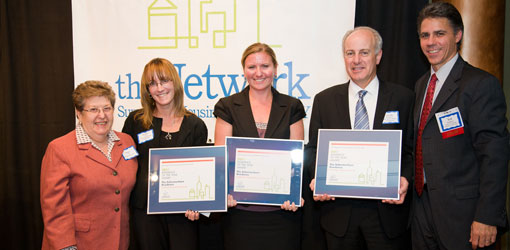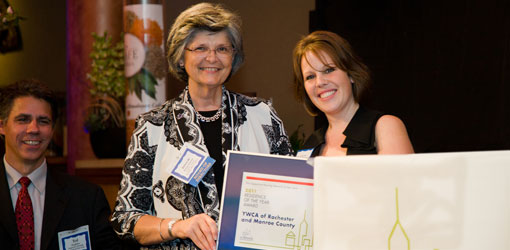Every year, the Network honors two outstanding supportive housing residences at its Awards Gala. In 2011, we selected The Schermerhorn and Kathlyn Gardens. Learn more about these remarkable residences below.
The Schermerhorn

Left to right: Comunilife President/CEO Dr. Rosa Gil, Common Ground Executive Director Brenda Rosen, Schermerhorn Program Director Stacy Matuza, Actors Fund President/CEO Joseph P. Benincasa and Network Executive Director Ted Houghton.
Certainly, the Schermerhorn Residence’s beautiful, light-filled design sets it apart. So does its distinctive mix of tenants -- chronically homeless individuals and low-income arts professionals. But what really knocked our socks off about the Schermerhorn is the sense of community -- among tenants, in the residence’s relationship with its surrounding neighborhood and within the three agencies that make it work: Common Ground, the Center for Urban Community Services and the Actors Fund. In every way, the building exemplifies the modern paradigm of supportive housing.
Located in Brooklyn’s Boerum Hill neighborhood, the 217-unit residence adds both architectural dazzle and uncommon community space to the neighborhood. A theater and 2,000 square-foot rehearsal space built for the Brooklyn Ballet also serves community groups, as well as tenants. Other amenities include a fitness room, a computer lab and a still-in-construction terrace. The much-in-demand community room is shared with the surrounding community; the 84th Precinct Community Council holds its meetings there.
But it is the unique, integrated mix of support services delivered by the three participating organizations that stands out. The three agencies’ long-working relationship in other residences was cemented among onsite staff by co-locating their offices and “surviving” the building’s first months of life while still under construction. Common Ground developed and now operates the building (which won a 2011 prize from the American Institute of Architects). Common Ground’s longtime partner CUCS provides comprehensive support services to the 116 tenants who were chronically homeless and coping with either a mental health or chronic health issue, most referred directly from living on the street. These services include CUCS’ signature Career Network, through which half the individuals enrolled are currently working. The Actors Fund, which joined forces with Common Ground to develop it, also provides recreational services to the entire building and support services to the 100 low-income tenants, nearly half of whom are from the arts and entertainment world. As a result, the community is treated to trips to museums, theater and parks, a book club, screenwriting 101, “chair yoga,” a cooking class, massage and personal training. Residents are also encouraged to volunteer at a nearby soup kitchen and participate in regular talent shows. Resident musicians entertain other tenants and staff at the regular holiday parties, which bring everyone in the building together.
True to its unique population, the Schermerhorn feels very much like a high-concept, raucous and difficult-to- perform off-Broadway show that you want to see again and again. The Network is proud to offer its review of the three organizations’ bold experiment and celebrate the Schermerhorn as an Outstanding Residence of the Year.
Kathlyn Gardens

Left to right: Network Executive Director Ted Houghton, Catholic Charities Housing Office of Albany Executive Director Deborah Damm O'Brien and YWCA of Rochester and Monroe County Housing Director Carrie Michel-Wynne.
Much of what you need to know about Kathlyn Gardens is in its name: “Kathlyn” honors the family that donated the 1940s apartment complex to the YWCA of Rochester so that other families -- ones trying to escape poverty and abuse – could reach their potential. “Gardens” refers to the feeling of the place: a safe haven where mothers and their children can grow strong.
Physically, the Gardens creates its own community: The building’s 12 twoand three-bedroom apartments form a “U” shape, with a courtyard nestled in the center where children can play and women can talk. The courtyard is also where the community celebrates holidays and has frequent summer barbeques and picnics. And, because the Gardens straddles the border of Rochester and the suburb of Irondequoit, the kids who live at Kathlyn Gardens can go to excellent suburban schools.
A core tenet of the YWCA’s mission is to empower women, and that lies at the heart of support services at Kathlyn Gardens: Services empower the mothers, the children and the community. Case managers work with the mothers to outline goals within the first 72 hours of move-in, including getting a job, healthcare and counseling. For the children, case managers work closely with school liaisons to make sure the kids who have not known much stability acclimate successfully.
A perfect example of the success of Kathlyn Gardens is Lydia Rodriguez, a runner-up for 2011 Tenant of the Year. Not only did Ms. Rodriguez successfully grapple with the long-term psychic and physical damage incurred by years of nearly fatal domestic violence so that she could achieve her central goal, to reunite with her children, she is now one of the Y’s leading advocates. She helped create a “greeting committee” for new tenants, she travels to churches around the community speaking out about domestic violence and has worked with the Y and the Network to fight for supportive housing service funding.
The community at Kathlyn Gardens is not just close-knit; it is strongly connected to the larger community. Nearly all the tenants at Kathlyn Gardens are connected to some form of “giving back” -- volunteering at nursing homes and churches, speaking to raise awareness about domestic violence and advocating in Albany.
For its embodiment of what supportive housing can do for families and communities, Kathlyn Gardens is a 2011 Outstanding Residence of the Year.
